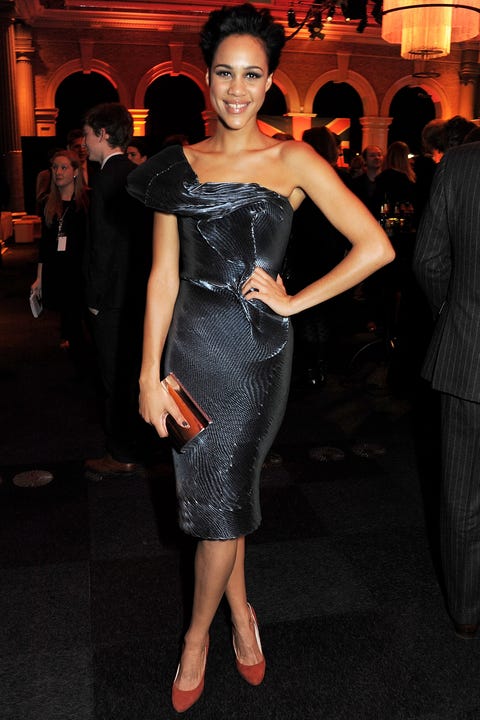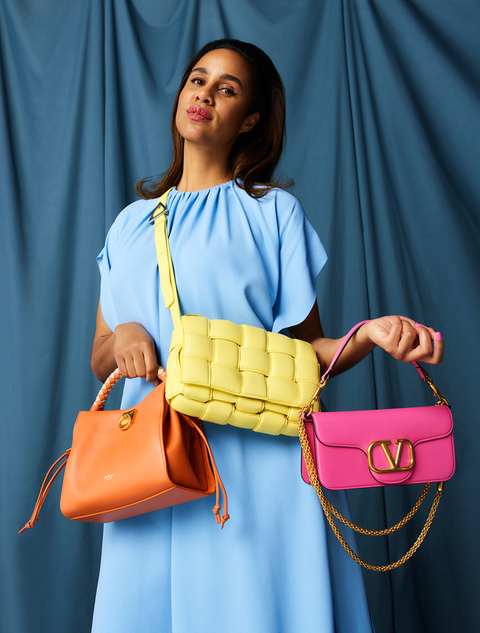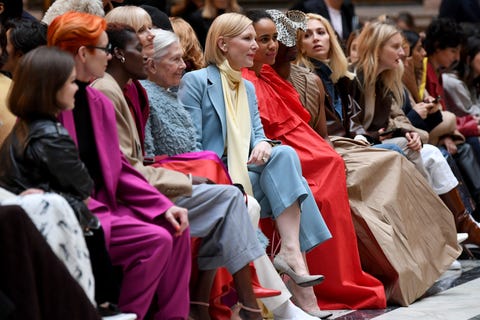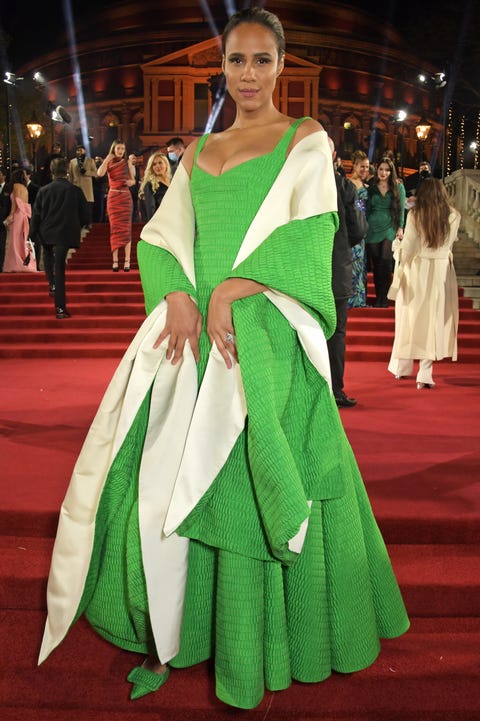Zawe Ashton was ahead of the curve when it came to shopping secondhand. After spending her formative years on the high street, as most teenagers did, the actress discovered a passion for pre-loved fashion when she went to college in London in the early Noughties.
“Secondhand pieces of treasure were the currency,” Zawe Ashton tells me over the phone, reminiscing about those college days. “Vintage was suddenly cool and we spent our time putting outfits together from different eras and scouring vintage and charity shops.”
This fascination with shopping secondhand only intensified when she later moved to Manchester, and found endless inspiration from the city’s vibrant Northern Quarter. Ashton worked in one of the area’s biggest hubs for vintage shopping, where she sourced some of her favourite gems to-date and started to experiment with her style.
“As a young drama-school student, I was really beginning to experiment with roles and started to find characters in the vintage I was buying,” she recalls. “I was finding some really precious stuff that I still have today – a vintage Eighties cheerleading outfit that would probably take me a while to wriggle into now,” she laughs. “Another special find is my Jimmy Choo clutch bag. At the time, I’d been nominated for a British Independent Film Award and back then loaning clothes was so new to me and I didn’t have a stylist, so I just relied on the kindness of fashion houses and designers that I formed personal relationships with.” Having borrowed a dress and shoes from a brand, she needed the perfect bag to go with it: she found the dream Jimmy Choo clutch on eBay and picked it up en route to the red carpet. “That was a special pre-loved moment,” she recalls. “It made me realise you’re ultimately in charge of dressing yourself for these events, so you can be more imaginative.”
Being an early champion of secondhand designer fashion made the actress the perfect fit to front eBay’s campaign for its new authentication process, which ensures any bag over £500 will now go through rigorous checking in a bid to build consumer confidence.
Following previous successful projects to authenticate watches and sneakers, as of this month, eBay is now working with a team of authenticators who will physically inspect luxury handbags by hand, as well as using specialist machinery. Any designer bags for sale will first be verified by an authenticator, checking that it matches the listing and inspecting the quality, from the stitching to the zippers. All bags will then get an Authenticity Guarantee card to prove their status, and sellers who offer returns get the same verification protection as buyers – allowing users to both shop and sell with certainty.
“I’ve definitely bought a few dud designer pieces [in the past] and I wish I’d had some kind of guarantee to help with that, especially when shopping secondhand online or for the first time,” says Ashton of the partnership.
Of course today, buying pre-loved fashion and contributing to a circular fashion economy is more commonplace than ever before, as we all seek to live more sustainable lives.
“Trends turn over so quickly now,” she says. “You can start to get carried away with it, rather than taking the time to explore what your own sense of style and expression might be.
“The younger generation are really targeted by these fast trends. So if there’s anything I would love to say to that generation, it’s to take a moment to find your authentic expression through how you dress and, while you’re doing that, you could also really be helping the planet that you’re about to inherit.”
Currently, the fashion industry is the second most damaging industry to the planet. The sector accounts for about 8-10 per cent of global carbon emissions and nearly 20 per cent of wastewater. Alarming statistics indeed.
Ashton is all too aware that being more eco-conscious with our habits has never been more vital – and that challenging misconceptions around secondhand shopping is key to promoting mindful purchases.
“Trend cycles have sped up in the past 10 years and we are conditioned to use that as a way of staying relevant,” she says. “Sometimes people are hesitant to step away from the crowd, which I totally understand, but it’s OK to break away from that.”
Celebrities wearing vintage on the red carpet has done wonders for the reputation of secondhand clothing; these are pieces with character, history and a uniqueness that’s just not possible to replicate when buying new. But, with so much out there, where should vintage newbies start?
“Pre-loved doesn’t have to be a chore or a slog – it just means you’re authenticating your own journey of consumerism,” says the actress. “You can become more authentically yourself when you think more consciously about our planet, which goes a lot further outside of just shopping.”
“Finding inspiration is a really great start,” advises Ashton, who takes her own inspiration from a variety of sources – from stars whose style she admires, like Alexa Chung and Grace Jones, to the Punk Era or French cinema. “There are so many apps and sites to browse images of different styles and eras and see how people have put together different pieces.”
Aside from shopping secondhand, Ashton makes an effort to be more eco-conscious in other ways. The British actress loves to support sustainable brands and make her existing wardrobe work harder, by mending older pieces that might need some TLC.
“I’m also trying to just buy less and just have a more conscious approach,” she says. “I know it’s really hard to do that, as we are all different heights, dress sizes, and different physicalities. But often you can get pieces tailored. It’s about changing the psychology around shopping; those who previously loved fast fashion might now just be investing in one or two pieces they know will last. That’s the mixture I’m trying to get behind, as well as rental and re-wearing stuff on the red carpet, as that really sends a message.”
When it comes to repeating outfits, A-List stars such as Cate Blanchett and Emma Watson, and even royals like the Duchess of Cambridge, have been known to regularly re-wear dresses to big events, highlighting the importance of making the most of what we already have. So does Ashton feel a sense of responsibility to lead by example?
“We’re really on code red right now and everyone has a responsibility,” Ashton says. “Everyone has their part to play. I think you can’t get away from the fact that if you have a public persona or profile as part of your work, you can’t deny that there is a faster way to spread that vital message. I’m a work in progress; I’m really enjoying the journey of working out how I can work these parts of my job in a different way for the better.
“There’s also a lot of responsibility on big corporations, as the individual citizen can only do so much. I hate the way you can feel unbelievably guilty if you slip up and end up spiralling and feeling bad for your own impact. But you have to remember that huge corporations are actually still so responsible for the majority of issues that we’re facing.”
While things are definitely improving and we’re thankfully seeing more brands prioritising the planet, there’s still a long way to go. “It’s up to the fashion industry to answer the questions of its own accountability,” agrees Ashton. “It’s great to see that the access to rental has improved, [as well as] the quality of rentals, the businesses offsetting their footprints, and the scope of brands available. This will only encourage more people to go down that route. I really hope that continues to grow.”
As for Ashton’s own personal journey? It’s all centred on mindset. “It’s about changing my psychology and helping to change other people’s. I turned an old pair of tights into a headband the other day,” she laughs. “It’s amazing what pops up on your radar when you start to change your psychology. Once you start to think about the terrible landfills, toxic chemicals, and the people who are being used to make these clothes in the most atrocious conditions, you’ll rethink everything.
“It’s really a work in progress that keeps evolving. If there’s a panic-buy you make last minute for a holiday, wedding or interview, you can offset that by buying pre-loved next time or opting for rental. Rewear the garment or tailor it so it becomes a forever piece. This isn’t about making the individual feel guilty, because there’s enough of that. I’m really not perfect and certainly don’t have it all figured out yet, but know that my mindset is really changing and that’s the most important thing.” We couldn’t agree more.
https://www.harpersbazaar.com/uk/fashion/fashion-news/a40044084/zawe-ashton-preloved-fashion-ebay-authentication/
 fashion rec fashion wanted
fashion rec fashion wanted






